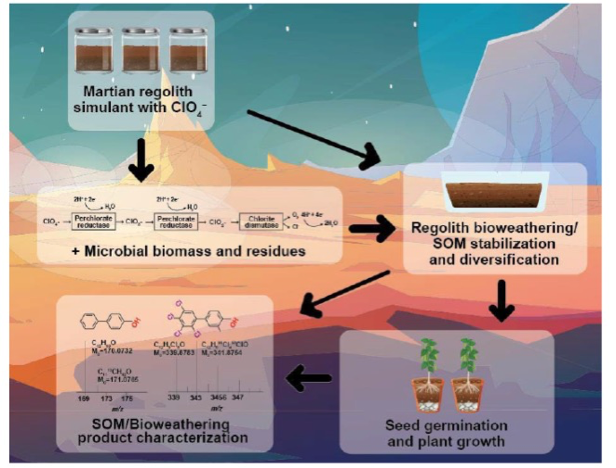EFRI ELiS: Bioweathering Dynamics and Ecophysiology of Microbially Catalyzed Soil Genesis of Martian Regolith
Science Objectives for Everyone
A human mission on Mars in likely to happen in the next twenty years. Identifying viable food sources – i.e., growing edible plants in Martial soil – is mission-critical given the significant distance from Earth to Mars. The Martian soil contains perchlorate salts at concentrations harmful or fatal to most forms of life. Perchlorate salts impede plant cultivation in soil, jeopardizing food security, life support systems, and human health. In this project, researchers will use microorganisms to remove perchlorate from Martian soil simulants and produce soil organic matter containing organic carbon and inorganic nutrients. The team will study how weathering of Martian soil simulants by microorganisms can engineer soil heath and how plants grow in response to soil improvement by microorganisms.
Experiment Description
Research Overview
- Perchlorate reduction in unsaturated and saturated Martian regolith simulant. Studies will be conducted with perchlorate-reducing microorganisms to determine the kinetics and extent of perchlorate reduction and to characterize the physical and biochemical modifications induced my microbial activity in Martian regolith simulants containing perchlorate.
- Microbiome succession during genesis of soil from Martian regolith simulant. Experiments will be conducted to test the hypothesis that production of chemically diverse, stable soil organic matter can be intimately coupled with microbial perchlorate reduction in Martian regolith. Defined microbiomes will be used to stabilize and diversify the primal soil organic matter formed after microbial perchlorate removal in the regolith simulant. Soil organic matter produced in Martin regolith simulant will be characterized with advanced mass spectrometry tools.
- Seed germination and plant growth in bioweathered Martian regolith simulant. Bioweathered Martian regolith simulant will be used as a substrate for studies on germination and growth using various plant species, including lettuce, thale cress, and tomato.
Mars regolith, or the surface material of Mars, is sterile and contains high concentrations of toxic perchlorate salts. In addition, the Mars regolith is devoid of soil organic matter (SOM) making plant cultivation for bio-regenerative life support and food production on Mars extremely challenging. The goal of this project is to design and develop scalable microbiological technologies and solutions to generate an organic and nutrient rich soil from Martian regolith. The guiding hypothesis of the proposed research is that the core metabolic processes of selected microbial consortia can be tuned to couple the production of a chemically diverse and stable SOM with the microbial reduction of perchlorate salts in Martian regolith. The specific objectives of the research include 1) experimental investigations of the extents and rates of perchlorate reduction by the selected microbial consortia under relevant Mars conditions using unsaturated and saturated regolith simulants, 2) characterization of the composition of the SOM and the bioavailable elements/nutrients that are generated from the microbial weathering of Mars regolith simulants using high resolution mass spectrometry coupled with liquid chromatography, and 3) demonstration of sustained seed germination and plant growth in the soil samples generated from the microbial weathering of Martian regolith simulants. The successful completion of this project has the potential for transformative impact through the generation of fundamental knowledge and the development of new methods to enable the conversion of sterile and toxic soils to organic and nutrient rich soils that could support plant growth and crop cultivation for a human mission on Mars.
Space Applications
The project is expected to produce knowledge and methods for soil genesis and plant cultivation in Martian regolith simulant to advance human missions to Mars.
Earth Applications
Knowledge from this project will enhance on-going efforts on microbial treatment of soil and water contaminated with perchlorate.
Team
Principal Investigator
Anca G. Delgado
Arizona State University, Tempe, Arizona, United States
Co-Investigators
Andrew Palmer
Florida Institute of Technology, Melbourne, Florida, United States
Malak Tfaily
University of Arizona, Tucson, Arizona, United States
Senior Personnel
Timiebi Aganaba
Arizona State University, Tempe, Arizona, United States
Jean Larson
Arizona State University, Tempe, Arizona, United States






























